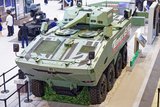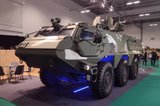Hungary seeks supply chain independence with new ordnance plant
The new plant will produce explosives for MBT and artillery ammunition. Hungary is currently taking delivery of 24 PzH2000 self-propelled howitzers from Rheinmetall. (Photo: Hungarian Defence Forces)
The Hungarian government has commissioned a new plant to produce RDX (Research Department eXplosive) at a site in Várpalota.
South Africa's Rheinmetall Denel Munition will supply plant technology and the facility will be built and operated by a JV consisting of Rheinmetall and Hungary's N7 Holding, a state-owned enterprise.
The contract is valued in the low three-digit million-euro range.
Related Articles
Embraer aims to build up local MRO capability in Hungary
Rheinmetall expands into Spanish market with Expal acquisition
Rheinmetall Lynx aims for more customers
Planning has been completed, with site work due to start in 2023, allowing production by 2027. The explosives produced will be used for artillery, tank, and mortar ammunition, inter alia.
The Rheinmetall contract covers plant engineering, technology, and processes as well as associated documentation and training.
A company release described the project as a 'strategic investment by Hungary in cooperation with Rheinmetall in response to the shortage of explosives resulting from strong demand for ammunition in Europe and NATO'.
It will also promote Europe's independence from overseas imports in this sector and forms part of Hungary's Zrínyi 2026 initiative. Rheinmetall is already building 172 Lynx KF41 infantry fighting vehicles in Hungary under a 2020 contract.
When the plant is completed and taken over by the Hungarian government, Rheinmetall will be the primary customer for its products.
More from Land Warfare
-
![US DoD task force’s DroneHunter acquisition lays groundwork for Replicator 2 CUAS strategy]()
US DoD task force’s DroneHunter acquisition lays groundwork for Replicator 2 CUAS strategy
As the US Department of Defense looks to counter the growing threat of uncrewed aerial systems to improve homeland security, the DroneHunter acquisition could point to future commercial innovation.
-
![Norway opts for Hanwha’s Chunmoo for long-range fires under $2 billion deal]()
Norway opts for Hanwha’s Chunmoo for long-range fires under $2 billion deal
The selection of Hanwha’s K239 Chunmoo long-range precision fires system, with a contract expected to be signed on 30 January, makes Norway the second European country to choose the system. It is expected an operational system will be in service within four years.
-
![Land forces review: Tanks, trucks and IFVs dominate but woes remain for Ajax]()
Land forces review: Tanks, trucks and IFVs dominate but woes remain for Ajax
This year has begun with main battle tanks taking the lead while orders for large logistics and support vehicles continued from last year. Additionally, two of the British Army’s most significant contracted vehicle programmes, Ajax reconnaissance vehicle and Challenger 3 tank, continued to make news in January.























